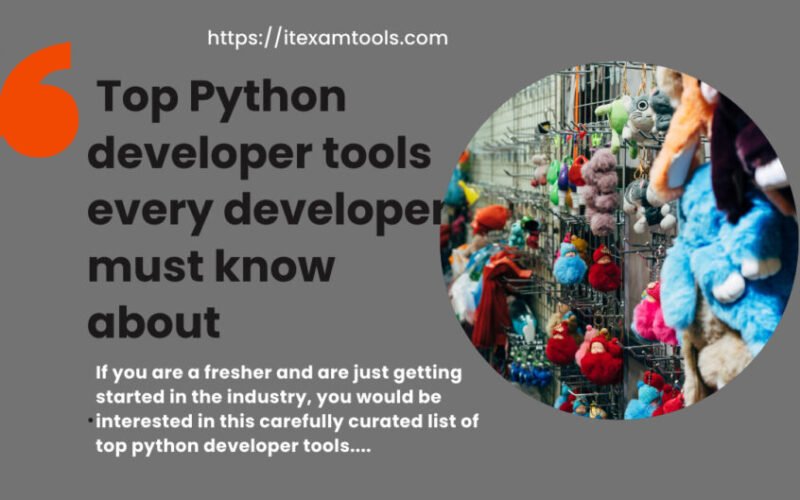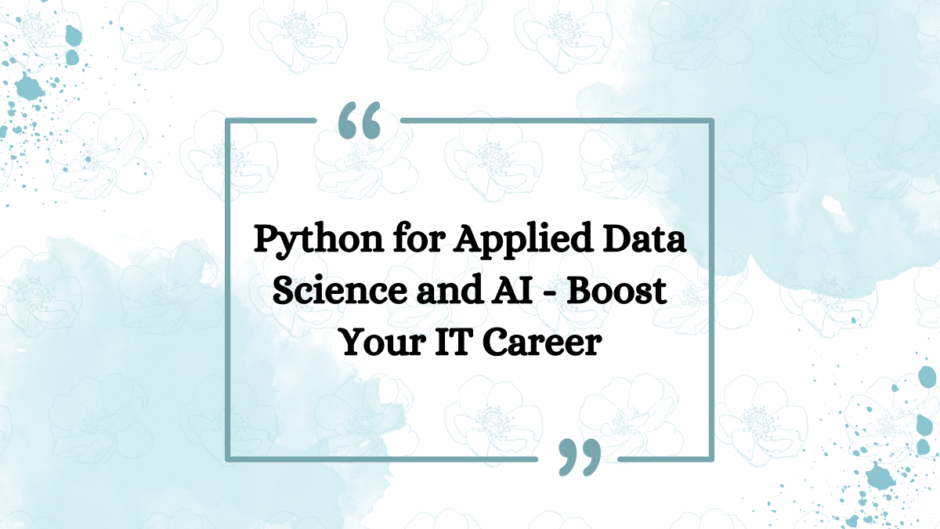Cisco OSPF Basic Configuration In this Cisco CCNA tutorial, you’ll learn how to do a basic configuration of OSPF on our Cisco routers. Scroll down for the video and also text…
Top Python Developer Tools You Should Know

Top Python developer tools every developer must know about
Python is one of the most popular programming languages around the world. It is widely used by developers and people in the Data Science community.
Python is widely known for several reasons and is primarily used to fulfill these two purposes:
- Simple syntax – You can learn Python, which is almost as easy as mathematical syntax.
- Broad coverage – It provides comprehensive coverage regarding Data Science and Scientific Computing.
Learn data science to gain edge over your competitors
What Python developer tools are available out there?
To understand the ‘tools of the trade,’ it is essential to know that python libraries come in a variety and can be utilized according to one’s own needs.
To master the most common tools available out there, one must research well to identify their needs and the services that the tools have to offer.
This page will discuss the different types of python tools and how you can use them to your advantage.
If you are a fresher and are just getting started in the industry, you would be interested in this carefully curated list which provides the ‘tools of the trade.’

The Python tools that can be used in the field of Data Science are Scikit-Learn, Keras, Theano, and Scipy, to name a few.
- Scikit-Learn
- Keras
- Scipy
- Theano
- Scikit-Learn – Sci-kit Learn is a tool designed specifically for Data Science and Machine Learning. It is an open-source tool used extensively by developers, data scientists, and machine learning engineers. Anyone looking for data mining and analysis can use this tool to see the best results.
One of the top advantages of using Scikit-Learn is that it encourages performance at remarkable speed for inbuilt toy datasets.
The primary characteristics of this tool include data splitting, Linear Regression, Logistic Regression, Decision Trees, Random Forest, and XG Boost. In addition, it provides a user-friendly interface with a grid and random searches.
- Keras – Keras is an open-source library written in Python. Suited for Machine Learning and Deep Learning, this tool provides a high-level neural network. Using Keras as a Python tool allows you to express neural networks conveniently. Keras is based on a few core principles: user-friendliness, extensibility, and availability for Python.
Keras provides many features, including Modularity, Large Dataset, Evaluation and Prediction, and Encoding, employing faster deployment.
It has multiple backend and modularity. It can run atop other neural networks like CNTK and Theano.
- Scipy – Scipy is an open-source library that is Python-based. Several fields, including Mathematics, Science, and Engineering, utilize Scipy, which is extensively used in Scientific and Technical Computing. It uses other Python packages such as Pandas and IPython to create libraries. Science-oriented and standard mathematics programs use these libraries.
Scipy is a commonly used library for Python developers. Scipy has many functionalities and can be used for various tasks.
It optimizes performance apart from providing high-level commands for visualizing data. It also enables interactive sessions with Python. Not just that, it is easy and faster compared to its competitors.
- Theano – Theano is another open-source Python library that allows its users to perform mathematical operations with multidimensional arrays. It offers super-fast numerical computation that runs over a CPU or a GPU. This library is a crucial prospect for Deep Learning that you can directly use to create Deep Learning models or wrapper libraries.
Theano provides stability optimization, symbolic differentiation, and executive speed optimization. It is built to simplify any process.
The downsides of Theano include running in a single GPA. It also requires more compiling time for more extensive and complex models.
Besides, error notices are hard to find, making debugging even more difficult.
Check our US – Data Science Programs
For Automation Testing Python developer tools, you can use Python libraries such as Selenium, Robot Framework, and TestComplete.
- Selenium
- Robot Framework
- TestComplete
- Selenium – Selenium is a web driver. Its library is also called Selenium. It is one of the best open-source libraries for browser automation. Web applications primarily require Selenium. Using Selenium, it is possible to write test scripts for other programming languages such as Java, C#, Python, Ruby, and .Net.
Some advantages of using Selenium include Language and Framework support, Open-source availability, multi-browser support, and flexibility.
You can also perform tests from any browser in all three popular operating systems – macOS, Windows, and Linux.
Not just that, you can integrate tools like JUnit and TestNG with Selenium for generating reports and running test cases.
- Robot Framework – Robot Framework is yet another open-source library that implements a generic test automation framework. It is designed for acceptance test-driven development (ATDD), robotic process automation (RPA), and acceptance testing. It integrates several framework data per the data automation requirement.
Robot Framework uses tabular data syntax. It is a keyword-driven, free automation tool that is easy to install.
It allows free use of Gherkin and works for both mobile and web applications. Robot Framework basics are easy to learn.
- TestComplete – TestComplete is an automation testing software that supports both mobile and web. Like Robot Framework, it lets you perform keyword-driven testing. TestComplete requires its users to have a commercial license to use it. It supports numerous languages, including VBScript, Python, and C++ script.
TestComplete also carries artificial intelligence recognition abilities, which can identify and update UI objects.
In turn, it helps in decreasing efforts in maintaining test scripts. It also supports you with free training. Apart from these features, it is also a smart add-on for Python.
Web Scraping is an available feature that can be performed using Python tools designed for Web Scraping, specifically. This list features the Web Scraping tools that you might like to consider.
- LXML
- MechanicalSoup
- Scrapy
- BeautifulSoup
- LXML – LXML is a tool designed using Python for C libraries, including libxslt and libxml2. It is recognized as a handy tool filled with rich features and libraries. LXML is a widely known Python tool for web scraping. In the Python language, it is used for processing XML and HTML. ElementTree XML API gives you secure access to libxslt and libxml2 libraries.
The advantages of using LXML are its efficiency and fast-paced design. Apart from being useful for matters relating to speed, it is also lenient.
Besides, reading and writing data takes an insurmountable amount of time. LXML makes the process easier. Its disadvantages include being dependent on external C.
- MechanicalSoup – MechanicalSoup is yet another Python lib that is used for automating requests with websites. It provides a similar API regarding document navigation, as in the case of BeautifulSoup. MechanicalSoup automatically saves and sends cookies. It follows redirects and can follow links and submit forms.
In the past, MechanicalSoup remained inactive for several months as it did not support Python 3 before.
As a benefitting point, MechanicalSoup is easy and faster to use the Python library. The disadvantage of using MechanicalSoup is that it does not fully duplicate browser functionality, client-side javascript, to be particular.
- Scrapy – Scrapy is a free-to-use, open-source Python tool with a collaborative framework that helps extract data you may need from websites. It was initially designed for data scraping and can be used to scrape data using a general API or a general-purpose web crawler. It gives you the tools you need to scrape data from websites efficiently.

You can scrape data from websites using Scrapy and then process it as you want before storing them in your preferred format.
Apart from web scraping, it can be used for many tasks, from data mining and automated testing to monitoring. Scrapy supports either version of Python 2 or Python 3.
- BeautifulSoup – BeautifulSoup is a Python library that can be used explicitly for pulling data from XML and HTML files. It is mainly designed for screen-scraping projects. Much like Scrapy, this is an HTML parser. This Python library provides easy ways for Pythonic idioms to navigate, search, and modify a parse tree.
BeautifulSoup is the oldest Python web scraping tool out there. BeautifulSoup automatically converts incoming documents into Unicode. For outgoing documents, it converts them to UTF-8. BeautifulSOup is an accessible library that has robustness against HTML errors too.
Key points to takeaway
- Python is a popular programming language with mounting career opportunities.
- The above tools are among the top Python tools sought in the data science industry.
- Data Science and Python Library go hand in hand and provide a vast scope for improvement and learning.

Jump-start your career as a Python Developer
Python tools have been standard since the time Python has developed. For these tools to be utilized successfully, you must sort out your needs first.
Whether using python libraries for data sciences, automation testing, or web scraping, you can use them to your advantage. In addition, being a popular language, Python has many exciting career opportunities.
Suppose you want to know more about python developer tools and career opportunities. In that case, you can enroll in the Data Science Post-graduate Diploma Program affiliated with IIT, Bombay in upGrad.
Key highlights of the program:
- Designed for working professionals
- IIT Bangalore Alumni status
- 60+ Industry Projects
- No-cost EMI option
- Career mentorship sessions
- High-performance coaching
- Student support 24×7 availability
- Exclusive job opportunities and portal













